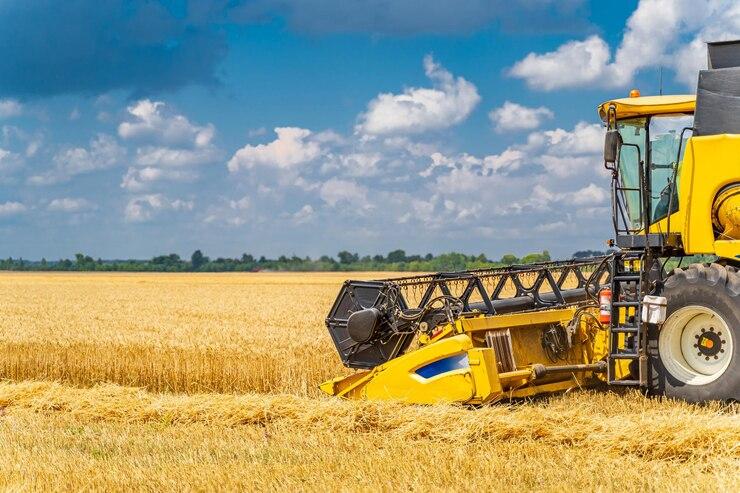A Multi-Purpose Machine For Indian Farms Is The Combine Harvester

A combine harvester, also known as a combine, is a piece of farm equipment used to harvest crops such as wheat, corn, and soybeans. It combines reaping, threshing, and winnowing, making it a highly efficient machine for harvesting grain crops.
The combine harvester cuts the crop with a header, or cutting platform, which is mounted on the front of the machine. The harvest is then fed into the threshing drum, which separates the grain from the straw and chaff. The grain is collected in a hopper, while the straw and chaff are blown out of the back of the machine.
Types of Combine Harvester
- Axial-Flow Combine Harvester: This type of combine uses a single rotor to thresh and separate the grain. The crop is fed into the rotor from the side, which creates a spiral motion that separates the grain from the stalks and chaff.
- Self-propelled Combine Harvesters: Self-propelled combine harvesters are agricultural machines that combine several operations into one pass through the field. They are designed to harvest crops quickly and efficiently with minimal manual labor.
- Tractor-Mounted Combine Harvesters: Tractor-mounted combine harvesters, also known as pull-type or trailed combine harvesters, are agricultural machines that are pulled behind a tractor to harvest crops. They are typically smaller and less powerful than self-propelled combine harvesters, but they are also more affordable and easier to transport.
Use of Combine Harvesters in India.
Combine harvesters have become more popular in India over the years due to their ability to harvest crops quickly and efficiently with minimal manual labor. Here are some ways combine harvesters are used in India:
- Wheat Harvesting: Wheat is one of the major crops grown in India, and combine harvesters are commonly used to harvest wheat. The machines can quickly cut and thresh the wheat, significantly reducing the time and labor required for manual harvesting.
- Rice Harvesting: Rice is another important crop in India, and combine harvesters are also used for rice harvesting. The machines can be equipped with special headers and attachments designed for rice harvesting, such as reel or draper headers.
- Soybean Harvesting: Soybeans are grown extensively in India, particularly in states like Madhya Pradesh, Maharashtra, and Rajasthan. Combine harvesters are used for soybean harvesting, and the machines can be equipped with auger headers designed for harvesting soybeans.
Benefits of Combine Harvesters to Indian Farmers
- Increased Efficiency: Combine harvesters are designed to harvest crops quickly and efficiently, reducing the amount of time and labor required for manual harvesting. This means that farmers can harvest larger areas of land in a shorter period of time, allowing them to plant and harvest multiple crops each year.
- Cost Savings: By reducing the need for manual labor, combine harvesters can help farmers save on labor costs. Additionally, the machines can be operated with fewer workers, reducing the overall cost of labor.
- Higher Yield: Combine harvesters can help farmers achieve higher yields by harvesting crops at their optimum stage of ripeness. This can help ensure that the harvested crop is of a higher quality and has a higher market value.
- Reduced Crop Loss: By reducing the amount of manual handling required during harvesting, combine harvesters can help reduce crop loss. The machines can harvest crops in a way that minimizes damage to the plants, reducing the risk of spoilage or loss.
- Improved Crop Quality: Combine harvesters are designed to separate the grain from the chaff and other plant materials, resulting in a cleaner, more uniform crop. This can help improve the overall quality of the harvested crop, making it more appealing to buyers and increasing its market value.
Visit KhetiGaadi.com for more information about the Tractor, Tractor price, Tractor Videos, Agriculture Machinery
- Art
- Causes
- Crafts
- Dance
- Drinks
- Film
- Fitness
- Food
- Games
- Gardening
- Health
- Home
- Literature
- Music
- Networking
- Other
- Party
- Religion
- Shopping
- Sports
- Theater
- Wellness
- IT, Cloud, Software and Technology


